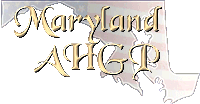Biography of Alexander W.
Wayman
Alexander W. Wayman, the 7th Bishop of the African
Methodist Episcopal Church, was born in Caroline County,
Maryland, during the month of September, 1821. He was
brought up upon a farm, and for a long while followed
agricultural life. Like a number of prominent colored
men of his class, he educated himself. In 1840 he united
with the A. M. E. Church, and, three years later, was
admitted to the ministry of that Church. After pastoring
congregations in Philadelphia, Baltimore and Washington,
he was finally made a Bishop. He had his residence in
the city of Baltimore for quite a number of years, and
it was in Baltimore that he entered into eternal rest.
He was a man of very great character, earnest and
powerful as a preacher, and was universally beloved by
both white and colored people, in all walks of life. He
died in Baltimore on November 30th, 1895.
In Bishop Handy's ''Scraps'' of history, the following
address uttered by Bishop Wayman, appears:
"In some of our Conferences, we had often been
discussing the propriety of sending missionaries to
Haiti and Africa. I said never would I consent to go, or
assist in sending any one there, until I could go all
over the South to see my brethren. I had for some years
selected the text to preach from when I went there, 'I
seek my brethren,' Gen. xxxvii, 16."
In the autumn of 1863 I received information that the
colored people, members of the Bute St. M. E. Church
South, in Norfolk, Va., were left as sheep without a
shepherd, and they desired to unite with the Baltimore
Conference of the A. M. E. Church if I would come down
and see them. I said, Here is an opportunity to preach
my text, I seek my brethren." I went to the protest
Marshal for a ''pass" to Norfolk. He said Military
affairs never interfered with religious affairs, and
therefore I would have to write to Norfolk for what I
wanted. I told him that the Military had us hemmed in on
every side; we could not go or come without their
permission. He finally said to his clerk: ''Give this
man a pass to Norfolk, Va."
Saturday afternoon came. I was off to old Virginia. The
night was very pleasant, indeed, and I was treated very
kindly indeed, by the steward and waiters; for some of
them were members of our church. Brother Peter Shepherd,
now a member of the Virginia Conference, met me at the
boat, and took me to the Church to see Sunday school in
operation. In the afternoon. Rev. Mr. Greely, who had
been temporarily serving them, administered the Lord's
Supper. At night I was permitted to take my text: "I
seek my brethren." They announced preaching for Monday
afternoon, and a meeting of all the official members for
Monday night.
Monday afternoon I addressed the congregation from the
text: "We are journeying to the place of which the Lord
said I will give it thee; come thou with us and we will
do thee good." Num. x. 29. At night the Board met. I had
prepared an instrument in writing for them to sign if
they agreed to unite with us. After it was read, one man
said, "I move we adopt it," and while they were
discussing, another brother said, 'Let us vote, for I am
all on fire for it." The vote was taken, and carried
unanimously.
I spoke again on Wednesday night, text: ''We will go
with you, for we have heard that God is with yon." Zach.
viii. 23. The secretary read to the congregation what
the Official Board had done, and they took a vote and
indorsed it. I returned to Baltimore rejoicing that I
had preached my text in old Virginia, "I seek my
brethren, and had taken a church of eight hundred
members, and the following named ministers: R. H.
Parker, James Tynes, Peter Shepherd, Americus Woodhouse
and Amos Wilson.
Maryland
Biographies | Maryland
AHGP

Source: Gazetteer of Maryland,
by Henry Gannett, Washington, Government Printing
Office, 1904.
|



